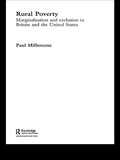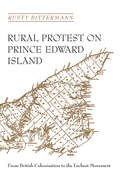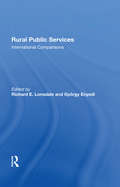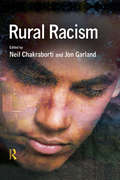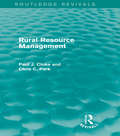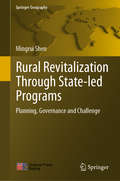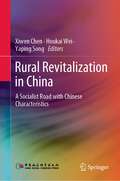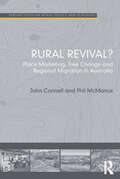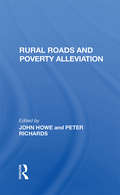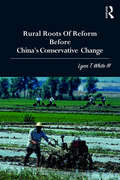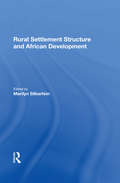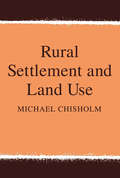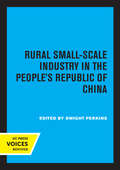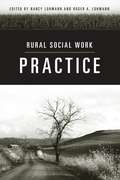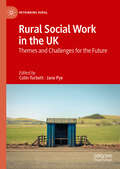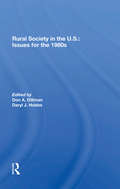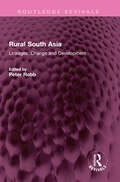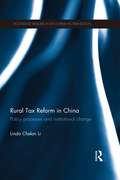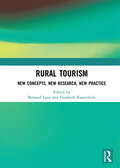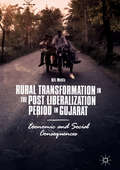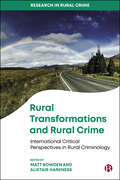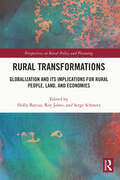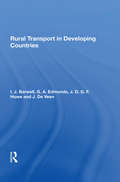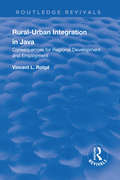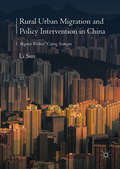- Table View
- List View
Rural Poverty: Marginalisation and Exclusion in Britain and the United States (Routledge Studies in Human Geography #Vol. 7)
by Paul MilbourneMoving beyond the highly visual forms of poverty characteristic of the city, Rural Poverty explores the nature of poverty in rural spaces in Britain and America. Setting out key features, it highlights the important processes that hide key components of rural poverty. The book seeks to challenge dominant assumptions about the spatialities of poverty and the nature of rural spaces in Britain and America. Drawing on a broad range of new research material, the book challenges dominant assumptions. It provides a comprehensive and critical review of the nature of poverty in rural spaces, giving particular attention to: the scale, profile and causes of poverty in rural areas the spatial unevenness and local geographies of rural poverty the experiences of different forms of poverty in rural spaces the shifting governance of rural welfare at central and local spatial scales. Demonstrating that poverty represents a significant but neglected feature of rural life in Britain and America, this insightful book highlights the processes through which rural poverty remains hidden from the dominant gazes of poverty researchers and policy-makers, the statistical significance and spatial unevenness of poverty in rural areas, the ways in which poverty is experienced in local rural spaces, and the complex governance of welfare in rural spaces. Case study material is drawn from a wide range of locations, including Wiltshire, Northumberland and Hampshire in the UK and New England in the US.
Rural Protest on Prince Edward Island: From British Colonization to the Escheat Movement
by Rusty BittermannWho has the more legitimate claim to land, settlers who occupy and improve it with their labour, or landlords who claim ownership on the basis of imperial grants? This question of property rights, and their construction, was at the heart of rural protest on Prince Edward Island for a century. Tenants resisted landlord claims by squatting and refusing to pay rent. They fought for their vision of a just rural order through petitions, meetings, rallies, electoral campaigns, and direct action. Landlords responded with their own collective action to protect their interests. In Rural Protest on Prince Edward Island Rusty Bittermann examines this conflict and the dynamic of rural protest on the Island from its establishment as a British colony in the 1760s to the early 1840s.The focus of Bittermann's study is the remarkable mass movement known as the Escheat movement, which emerged in the 1830s in the context of growing popular challenges elsewhere in the Atlantic World. The Escheat movement aimed at resolving the land question in favour of tenants by having the state resume (escheat) the large grants of land that created landlordism on the Island. Although it ultimately gained control of the assembly in the late 1830s, the Escheat movement did not produce the land policies that tenants and their allies advocated. The movement did, however, synthesize years of rural protest and produce a persistent legacy of language and ideas concerning land, justice, and the rights of small producers that helped to make landlordism on the Island unsustainable in the long term. Rural Protest on Prince Edward Island is a comprehensive and fascinating examination of an important, but often overlooked, period in the history of Canada's smallest province.
Rural Public Services: International Comparisons
by Richard E Lonsdale Gyorgy EnyediInterest in the special problems of rural areas and concern with rural development in general have increased substantially throughout much of the world in the years since about 1960. Attesting to this has been the dramatic increase in attention to rural problems in the scholarly and popular literature and by government agencies. At first the dominant focus was on development projects and the creation of new jobs. It was not long, however, until other related issues came to the fore, in particular the availability and quality of public services essential to achieve economic growth and improvement and having a direct bearing on the well-being of rural peoples. Most nations of the world have developed plans and launched pro-jects to improve rural public services and narrow urban-rural dif-ferentials in their provision. As one would expect, there have been great differences between nations in the severity of problems, foci of attention, program strategies and their general effectiveness, and degree of commitment and effort. Given this diversity, it seems ap-propriate to examine and compare rural service problems and efforts to ameliorate them in a sample of contrasting societies. Implicit is the conviction that (1) all nations can learn at least something from the experiences of others, and (2) by taking an international, com-parative view of the subject, certain generalizations can be established.
Rural Racism
by Jon Garland Neil ChakrabortiRural issues are currently attracting unprecedented levels of interest, with the debates surrounding the future of 'traditional' rural customs and practice becoming a significant political concern. However, the problem of racism in rural areas has been largely overlooked by academics, practitioners and researchers who have sought almost exclusively to develop an understanding of racism in urban contexts. This book aims to address this oversight by examining notions of ethnic identity, 'otherness' and racist victimisation that have tended to be marginalised from traditional rural discourse.
Rural Resource Management (Routledge Revivals)
by Paul J. Cloke Chris C. ParkThis book, first published in 1985, provides an overview of resource management, together with a geographical treatment of physical, landscape and social resources. Drawing on British, European and North American material, the book has three main objectives: to offer an integrated review of the rural resource system, to isolate potential and actual conflicts between resources in the countryside with the aid of detailed case studies, and to explore various broad management techniques and their applicability to differing types of resource use and resource conflict. This title will provide important insight for students of geography, resource management, environmental planning and conservation.
Rural Revitalization Through State-led Programs: Planning, Governance and Challenge (Springer Geography)
by Mingrui ShenThis book seeks to unravel the changes in rural governance sparked by state-led programs, evaluate the programs’ implementation, and refine the interpretation of governance theory with new empirical material from rural China. When it comes to rural issues in contemporary China, there is no shortage of national strategies: from “Coordinating Urban–Rural Development” in 2003 to “Rural Revitalization” in 2017, the rejuvenation of the countryside has attracted unprecedented policy interest. At the same time, rural governance has been subject to significant political, social and economic changes. However, comparatively little research has been conducted on the phenomenal reconnection between the state and rural society, and our previous understanding of rural governance is no longer adequate.As a result of the programs, a new model of governance is now emerging in rural China. The programs have accelerated the formation of state-private-farmer partnerships, while also promoting the participation of grassroots society in rural reconstruction. In the initial stage, the state’s role is important to securing non-governmental sectors’ engagement. However, this does not mean that the model guarantees sustainable governance: in terms of land tenure reform, infrastructure investment, and subsidies, the programs merely empower farmers and other stakeholders to engage in rural reconstruction. The success of these reconstruction efforts ultimately depends on a suitable pricing mechanism for public goods provision, as well as the self-organization of grassroots society.
Rural Revitalization in China: A Socialist Road with Chinese Characteristics
by Houkai Wei Xiwen Chen Yaping SongOn the basis of systematically summarizing and sorting out the significant achievements made since China's rural reform, this book comprehensively explains the theoretical basis, principles and strategies of the road to rural revitalization of socialism with Chinese characteristics. Through in-depth research on nine aspects of rural basic management system, rural deepening reform, food security, modernization of agriculture and rural areas, integrated development of urban and rural areas, poverty alleviation, new rural construction, ecological civilization construction and rural governance, this book puts forward the development direction and strategic choice of China's rural revitalization by the middle of this century. It not only enriches and develops the theory of development economics, but also provides experiences for rural development in developing countries.
Rural Revival?: Place Marketing, Tree Change and Regional Migration in Australia (Perspectives On Rural Policy And Planning Ser.)
by John Connell Phil McManusHow, if possible, to re-populate declining rural and regional areas? Examining this crucial and complex issue in relation to Australia, this book explores how a particular organization, 'Country Week', has emerged and developed as one means of stimulating the repopulation of declining or stagnating areas. While this is a problem shared by many other developed countries in Europe and North America, Australia's 'Country Week' programme puts forward an innovative range of place-marketing strategies that challenge rural decline and urban migration and can offer new approaches which could be adopted more widely.
Rural Roads And Poverty Alleviation (Rural Building Course Ser. #2)
by John Howe Peter Richards J D HoweThis book analyses the use of rural road networks and the causes and effects of road programmes in the areas of personal travel, education, health and poverty alleviation. It discusses the criteria which are being used for rural road selection and their impact in Egypt, India, Botswana and Thailand.
Rural Roots of Reform Before China's Conservative Change
by Lynn T. White IIIChina’s economic and military rise dominates discussions of the world’s most populous country. Resilient authoritarian government is credited with great successes, but this book expands the discourse to include governance by village heads - who often ignored central politicians. Chinese reforms for prosperity started circa 1970 under rural and suburban leaders. They could act autonomously then because of unexpected political and technological opportunities. Their localization of power eroded socialist controls. Since 1990, central leaders have tried to reverse reforms made by resilient local bosses. New findings, especially from the Yangzi delta around Shanghai, challenge the top-down approach to thinking about governance. As Deng Xiaoping admitted, the nation’s spurt of prosperity began in local communities rather than Beijing. Reforms for triple-cropping and rural industrialization started long before Mao’s death (not in 1978, the date most writers cite). Country factories competed with state industries for materials and markets. Shortages by the 1980s led to inflation, government deficits, unofficial credit, unenforceable planning, illegal migrations, then international exports - and severe political tensions. After 1990, Party leaders sought policies to build a Leninist regime that is mostly post-socialist. These reactionary changes have lasted into the era of Xi Jinping. China’s reforms and subsequent changes can be understood as results of unintended situations not just ideas, and local not just central politics. This book will interest students and scholars of Chinese, as well as any readers who wonder about comparative development.
Rural Settlement Structure And African Development
by Marilyn SilberfeinThis volume is the result of a group of researchers applying their insights and experience to a common theme. All the authors are con-cerned with rural development in Africa and all have focused on the con-nection between the development process and the arrangement of people and their built environment in rural space. Both anthropologists and geo-graphers have contributed to the dialogue on this subject and represen-tatives of the two disciplines are included in this volume. The members of this group have never all been in the same place at the same time, and so have utilized various electronic modes of commu-nication to link their locations around the world. Two conferences were organized, however, among a subset of the whole, in order to generate a group discussion. One of these meetings was a symposium on African rural development held at Temple University while a second was orga-nized at the African Studies Association Meetings in Toronto. Both opportunities helped raise issues that found their way into individual chapters. The audience in each case further stimulated our thinking.
Rural Settlement and Land Use: An Essay In Location
by Michael ChisholmTo a remarkable extent, students of location problems have fastened attention upon industrial and urban matters rather than upon agricultural and rural affairs. The preponderance of the former studies undoubtedly reflects the relative importance of the manufacturing and commercial sectors of the technically more advanced countries where most students of location matters have in the past resided. Perhaps it has also seemed that the locational problems posed by city life and factory employment are more amenable than those of the countryside to rigorous analysis.
Rural Small-Scale Industry in the People's Republic of China
by Dwight PerkinsThis title is part of UC Press's Voices Revived program, which commemorates University of California Press’s mission to seek out and cultivate the brightest minds and give them voice, reach, and impact. Drawing on a backlist dating to 1893, Voices Revived makes high-quality, peer-reviewed scholarship accessible once again using print-on-demand technology. This title was originally published in 1977.
Rural Social Work Practice: Oxford Bibliographies Online Research Guide
by Nancy Lohmann Roger LohmannFeaturing contributions from practitioners, researchers, and academics, this volume synthesizes and analyzes current trends in rural social work practice and considers the most effective ways to serve rural communities. Contributors consider the history and development of rural social work from its beginnings to the present day, addressing the value of the Internet and other new information technologies in helping clients. They also examine the effects of nonprofit organizations and welfare reform on poor rural areas. Coverage of specific client populations and fields of practice includes services for rural mental healthcare; the chronically mentally ill; healthcare for minorities; and the challenges faced by the elderly in rural areas. The contributors also consider issues affecting gays and lesbians living in rural communities and the role of religiosity and social support in the well-being of HIV/AIDS clients. The book concludes with a consideration of the unique issues associated with educating social workers for rural practice.
Rural Social Work in the UK: Themes and Challenges for the Future (Rethinking Rural)
by Colin Turbett Jane PyeThis book draws together writers from various backgrounds to discuss issues that affect those working in rural social work settings, on themes ranging from current issues that are common to rural localities (including those arising from the Covid-19 pandemic) to future challenges. Common themes that run through all the chapters and hold them together include community and place, stigma and alienation, inequality and social justice, and the environment. Several of the chapters include a strong user voice and challenge cis-heteronormative and other stereotypes of rural life by celebrating diversity in these communities. The book will therefore be invaluable to rural practitioners, students studying to work in rural settings and their educators, as well as rural sociologists and policy makers.
Rural Society In The U.s.: Issues For The 1980s
by Don A Dillman Daryl J HobbsMust rural Americans pay the price of urban progress and modern lifestyles? How will the increased pressures of the 1980s affect those who live and work in rural communities? In addressing these overriding questions the authors of this book take a serious look at such issues as who will operate our farms and how those farms will meet rising demands for food, how higher energy costs will change life in rural areas, the current and future needs of rural families and their communities, who in fact lives in these communities, and what can be done about escalating rural crime and recent social changes that have disrupted the traditional patterns of rural society. Because the United States is an interdependent system of rural and urban, of providers and consumers, these issues are vitally important to all-scholars, policy makers, and citizens alike. The contributors bring us up to date on the contemporary rural scene and offer suggestions for research essential to intelligent decision making about the challenges and problems the 1980s hold in store for rural America.
Rural South Asia: Linkages, Change and Development (Routledge Revivals)
by Peter RobbFirst published in 1983, Rural South Asia examines questions of change and development in terms of linkages between localities and the outside world. The authors examine the response specifically to the introduction of a ‘modern’ features of production, the importance of physical, cultural and economic communication, and the impact of various development efforts. This book will be of interest to student of South Asian studies, history, economics and agriculture.
Rural Tax Reform in China: Policy Processes and Institutional Change (Routledge Studies on China in Transition)
by Linda Chelan LiThis book examines questions of change and inertia in the context of the longstanding grievances over excessive taxation in rural China. How can some changes be sustained, whilst others cannot? How can a longstanding administrative practice be changed or even terminated, especially when previous attempts at change have failed? Using extensive interview data with local and central bureaucrats, Li's findings highlight the role of parallel developments and agency in the change process, as well as the prevalence of contingency and uncertainty. It also elegantly blends the narrative of the rural tax and administrative reforms with theoretical discussions to deepen our understanding of policy process and institutional change in 21st century China. Despite the authoritarian political system, the Chinese state-in-action which emerges from this book sees actions stemming from both the central and local levels, mediated by strategic design as well as contingency. This book will be of interest to students and scholars of Chinese Studies, political science and policy and development studies.
Rural Tourism: New Concepts, New Research, New Practice
by Bernard Lane and Elisabeth KastenholzThis book describes, analyses, celebrates and interrogates the rise of rural tourism in the developed world over the last thirty years, while explaining its need to enter a new, second generation of development if it is to remain sustainable in all senses of that word. Contributors include 29 leading researchers, practitioners and commentators from ten countries around the world. Subjects covered include the ongoing evolution of rural tourism as a genre; its numerous niche markets, and market trends; community involvement, and its impacts on rural landscape conservation and society. Special attention is paid to product development in rural tourism, including food and beverage tourism, avitourism and landscape appreciation. Management Issues are also dealt with, as is the impact of internet booking systems on both commercial performance and regional and national rural tourism governance. There is a review of trends in academic research in rural tourism with an analysis of 1848 refereed and published research papers since 2000. This book is a worthy successor to Bramwell & Lane’s pioneering 1994 publication, Rural Tourism and Sustainable Rural Development. This book was originally published as a special issue of the Journal of Sustainable Tourism.
Rural Transformation in the Post Liberalization Period in Gujarat: Economic And Social Consequences
by Niti MehtaThe book examines the pattern of non-farm development at the national level and identifies the correlates and determinants of occupational diversification for the major states. It is one of the few studies that unravels the dynamic processes associated with growth and development at the sub-national level; wherein it elucidates changes in rural employment pattern and its implications for urban growth. The book fills a crucial gap in current research, notably, an understanding of conditions that enable large villages to assume an urban character. By providing micro-level study of census towns to capture the nuances of the dynamic situation in the countryside, the book would offer useful insights and provide reference material on the social and economic impacts of urban growth, thereby satisfying the needs of students, researchers and practitioners of regional economics, rural development, and sustainable urbanization. The book is the outcome of financial support received under the Research Programme Scheme of the Indian Council of Social Science Research (ICSSR), New Delhi, India.
Rural Transformations and Rural Crime: International Critical Perspectives in Rural Criminology (Research in Rural Crime)
by Matt Bowden and Alistair HarknessWhat are the theoretical and conceptual framings of rural criminology across the world? Thinking creatively about the challenges of rural crime and policing, in this stimulating collection of essays experts in this emerging field draw from theories of modernity, feminism, climate change, left realism and globalisation. This first book in the Research in Rural Crime series offers state-of-the-art scholarship from across the globe, and considers the future agenda for the discipline.
Rural Transformations: Globalization and Its Implications for Rural People, Land, and Economies (Perspectives on Rural Policy and Planning)
by Roy Jones Holly Barcus Serge SchmitzThis book focuses on the transformation of rural places, peoples, and land endemic to the contemporary manifestations of globalization. Migration, global economic restructuring, and climate change are rapidly transforming rural places across the globe. Yet, global attention characteristically focuses on urban social and economic issues, neglecting the continued roles of rural people and places. Organized around the three core themes of demographic change, rural-urban partnerships and innovations, and landscape change, the case studies included in this volume represent both the Global North and Global South and underscore the complexity and multi-scalar nature of these contemporary challenges in rural development, planning, and sustainability. This book would be valuable supplementary reading for both students and professionals in the fields of rural land management and rural planning.
Rural Transport In Developing Countries
by I. Barwell G. A. Edmonds J.D.G.F. Howe J. De VeenFor more than three decades investment in the transport sector has been a priority for developing country governments. With a few exceptions, roads have accounted for the major part of these investments. The explicit, and often articulated, assumption upon which the decision to allocate such large sums of money to road transport has been made is that road transport and development are inextricably linked. The implicit, and rarely articulated assumption is that the provision of suitable roads will lead to the operation of an adequate level of road transport services. If roads do not actually produce economic development, it has been argued, they certainly play a major role. This belief in the ben-eficial effects of roads is not wholly unsubstantiated. Clearly the provision of some form of access is vital for the development of the rural economy. Nevertheless, the studies carried out over the last 10-15 years on the impact of highway investment have sounded a cautionary note. George W. Wilson, writing in the concluding chapter of the Brookings Institution studies on transport and development, suggested that* 'A much more sceptical attitude towards transport appears essential and far more attention needs to be devoted to the set of circumstances surrounding expansion of transport capacity'. 1 The suggestion of a more restrained attitude reflected a growing concern that transport, and in particular roads, was only one factor amongst a large number that needed to be integrated for effective development. The concern to see road transport in a wider context partly explains the move towards the evaluation of the social, as well as strictly economic, benefits of road construction.
Rural Urban Integration in Java: Consequences for Regional Development and Employemnt (Routledge Revivals)
by Vincent L. Rotgé Ida Bagoes Mantra Ryanto RijantaThis title was first published in 2000. Yogyakarta Special Region (known as Daerah Istimewa Yogyakarta in Bahasa Indonesia, or DIY) is located in the centre of the southern coast of Java. The region has a very long history and has undergone many changes and developments in agriculture, irrigation, population and immigration movements. Organized into four main sections, this text aims to provide a study of rural-urban integeration in the area, with particular reference to the consequences of development and employment. It introduces the region in geographical and economic terms, looking at the communities where fieldwork has been conducted. The results of these field studies are then presented, along with possible regional development policies geared towards encouraging the regional integration process. The important questions and implications of increasing rural-urban linkages for urban and societal changes in monsoon Asia are then reviewed on the basis of the lessons learned from the case studies in the DIY. Special attention is given to the consequences for employment and metropolitan changes in the wake of the changes taking place in this region.
Rural Urban Migration and Policy Intervention in China: Migrant Workers' Coping Strategies
by Li SunThis book examines rural-urban migration policies in China, and considers how Chinese workers cope with migration events in the context of these policies. It explores the contribution of migrant workers to the Chinese economy, the impact of changes within the ‘hukou’ system (household registration) and the impact of recent migration policies promoting rural-urban migration and targeting key events during migrant workers’ migration trajectories - job-seeking, wage exploitation, work injuries and illness - namely the corresponding ‘Skills Training Program for Migrant Workers’, the ‘Circular on Managing Wage Payment to Migrant Workers’, the ‘Circular on Migrant Workers Participating in Work-Related Injury Insurance’, and the ‘New Rural Medical Cooperative Scheme’ (Health Insurance). Through in-depth interviews, it examines how when facing such challenges, migrant workers choose to either make a claim under existing policies, or use other coping strategies. The book notably proposes a typology of “coping” which includes a variety of administrative coping, political coping and social coping, and considers how workers in China harness the power of civil groups and social networks.
